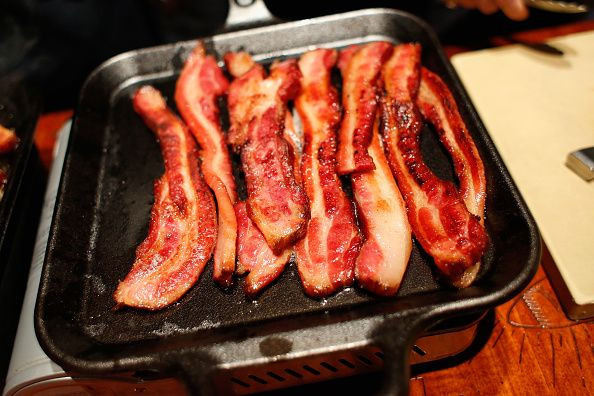National Bacon Day 2020: 12 Facts You Never Knew About The Delicious Pork Slab
KEY POINTS
- National Bacon Day is celebrated on Dec. 30 each year
- Spanish explorer Hernando de Soto was dubbed the father of the American pork industry
- The phrase "bring home the bacon" originated in the 12th century in an English church
Bacon has been an integral part of most American households' breakfasts for decades and even has a day dedicated to it. National Bacon Day is celebrated every Dec. 30, offering the chance to binge on it without guilt.
The holiday was first celebrated in 1997, as a way to take a break from celebrating the traditional winter holidays. For meat lovers out there, here are 12 facts that one may not know about this delicious pork product.
1. Bacon originated in China
It is believed that bacon was first enjoyed in China. The Chinese were curing pork bellies in salt as early as 1500 B.C. — creating an early form of the modern bacon enjoyed worldwide today, according to Scientific American.
Some historians also speculated that the Greeks and Romans learned bacon production and curing in the Middle East during the days of their conquests.
2. Hernando de Soto is dubbed the father of the American pork industry
Spanish explorer Hernando de Soto, who is most famous for his exploration of North America, is believed to have brought America's first pigs when his expedition landed at Tampa Bay, Florida, in May 1539, according to Georgia History.
3. Not all bacon is equal
In the U.S., bacon is made from pork belly, letting consumers enjoy much of its flavorful taste. In other countries, however, the side and back cuts of the pig are typically used to make bacon.
4. Bacon has made its name in pop culture
The breakfast staple has been a common topic of interest in today's pop culture. Homer Simpson, for example, has made his love for bacon known throughout the series "The Simpsons." Bacon-scented candles and soap are being sold all around as well, and so far, no one is complaining.
5. Bacon's popularity is unwavering
Even with the rise of healthy living and mindful eating, many still can't resist the urge to binge on bacon when given the opportunity — and for good reason too. Bacon remains one of the most popular food items in the U.S., generating billions of dollars in annual sales.
6. There are alternatives to pork bacon
Turkey bacon is also enjoyed in other countries as an alternative to the typical pork bacon. Consumers may also opt for bacon made from duck, lamb and venison.

7. Vegan bacon exists
There are now a plethora of vegetarian substitutes for bacon made from eggplant, coconut, tofu, tempeh and other plant-based products.
8. The best way to celebrate Bacon Day
According to the National Day Calendar, the best way to celebrate the holiday is to eat bacon guilt-free while watching a movie starring actor Kevin Bacon.
9. Bacon is not only for breakfast
Although it is more commonly eaten as a breakfast food, bacon has been incorporated into almost every meal. It makes an appearance even in sandwiches, drinks and ice cream.
10. Bring home the bacon
The phrase "bring home the bacon" originated back in the 12th century when a church in England offered a side of bacon to any man who could swear before the church that he had not fought or quarreled with his wife for a year and a day. Any man who could “bring home the bacon” was highly respected in his community.
11. Romans called bacon petaso
The Romans referred to bacon as petaso whenever they'd make it in the West and serve it to their families. They made petaso by boiling salted pig shoulder with figs and then seasoning the mixture with pepper sauce.
12. The first bacon factory opened in 1770
A businessman named John Harris opened the first bacon processing plant in the county of Wiltshire in England, where he developed a special brining solution for finishing the meat.
© Copyright IBTimes 2024. All rights reserved.





















